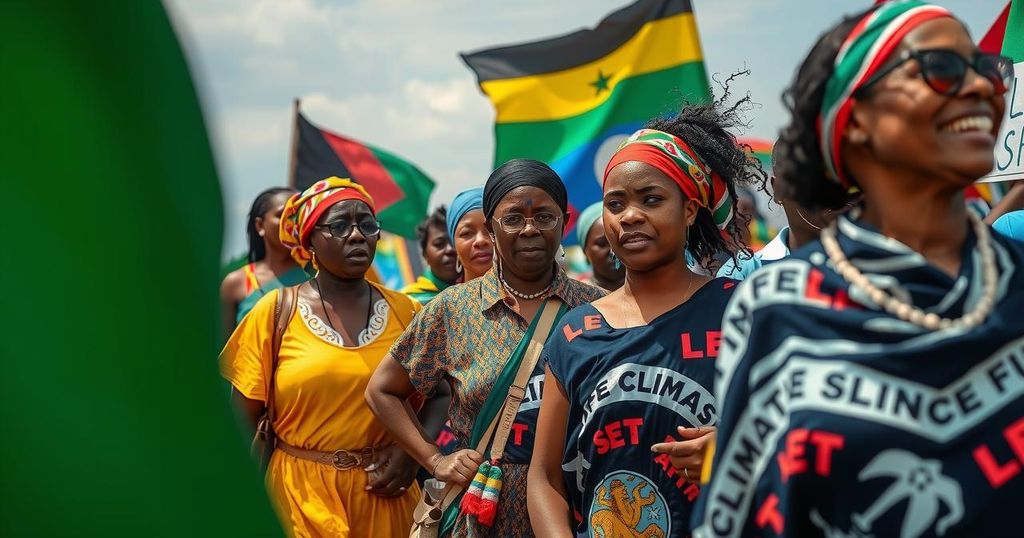Senegalese women marched in Dakar demanding climate justice from polluting countries ahead of COP29. They expressed dissatisfaction over the lack of action regarding climate change, particularly highlighting the impact of recent floods on rural communities and calling for accountability from major greenhouse gas emitters.
In Dakar, Senegal, approximately 50 women activists participated in a march on Saturday advocating for climate justice, coinciding with the lead-up to the 2024 UN Climate Change Conference (COP29) set to occur on November 11. The event, which has been organized annually since 2021, emphasized the urgent need for major greenhouse gas emitters to take significant action in reducing their emissions. The marchers conveyed their grievances through chants such as “Down with capitalism! Down with polluting countries!” while they processed through the Medina neighborhood, brandishing banners that called for the preservation of Senegal’s natural resources and envisioned a sustainable, decarbonized future. Cheikh Niange Faye, a former tour guide from the Thiès region, expressed dissatisfaction with the lack of progress over the four years of these marches, stating, “It has been four years that we have been marching, and nothing has changed. They are spending billions to conduct their conferences, but they owe us billions in compensation.” Faye highlighted the plight of rural communities, particularly women, who have faced increased flooding this year—a year marked by record floods in the Sahel region, severely impacting Senegal and damaging thousands of hectares of crops. Activists assert that the nations responsible for significant greenhouse gas emissions owe Africa reparations for the adverse effects of climate change, noting that Africa contributes a mere 3.8% of global emissions according to the Carbon Disclosure Project. One of the primary organizers, Khady Camara, reiterated the call for compliance with the Paris Agreement ahead of COP29. Moreover, environmental activist Khady Faye, who traveled from the Saloum Delta, voiced concerns over the impact of climate-related activities on vulnerable communities. Faye implored the need for responsible action regarding offshore drilling activities at the Sangomar oil fields, where operations commenced this year under the auspices of Woodside Energy, which holds an 82% stake in the project, urging, “Think about the suffering of these communities, think about the suffering of these women. Try to leave our delta alone, try to leave the gas at Sangomar underground, to let the community live normally.”
This article covers a recent climate justice march held in Dakar, Senegal, where women activists rallied against polluting countries in anticipation of the upcoming COP29 climate conference. The event underlines the intersection of gender and climate issues, emphasizing the impacts of climate change on rural women, particularly in regions like Senegal that contribute minimally to global emissions yet suffer disproportionately from environmental changes. The activists are demanding accountability and action from developed nations, highlighting the necessity for equitable solutions to the climate crisis, making a case that the nations contributing the most to greenhouse gas emissions have a moral obligation to support those most affected by climate change.
In summary, the Senegalese women’s march for climate justice underscores the urgent need for polluting countries to acknowledge their role in climate change and take substantial action to mitigate its effects. The activists articulate a strong message calling for reparations and adherence to international environmental agreements, reflecting the intersection of climate and gender justice. Their commitment to advocating for their communities in the face of ongoing climate adversity emphasizes the critical role of local voices in the global narrative on climate change.
Original Source: abcnews.go.com






